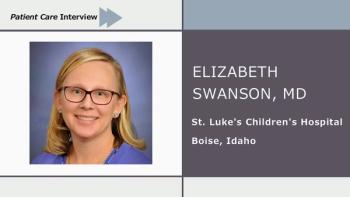
Panelists discuss how emerging therapies demonstrate promising efficacy data while highlighting the adverse metabolic and cardiovascular consequences associated with untreated vasomotor symptoms (VMS).

Panelists discuss how emerging therapies demonstrate promising efficacy data while highlighting the adverse metabolic and cardiovascular consequences associated with untreated vasomotor symptoms (VMS).

Panelists discuss how previous therapies lacked efficacy for vasomotor symptoms, while new treatments fezolinetant and elinzanetant offer superior effectiveness, with elinzanetant specifically addressing additional symptoms beyond the primary condition.

Panelists discuss how vasomotor symptoms (VMS) can persist for years with variable manifestations, significantly disrupting both social and professional spheres, resulting in multibillion-dollar economic losses through decreased productivity and increased insurance costs.

Raj Chovatiya, MD, PhD, MSCI, actually said symptoms "never" lie so, particularly in patients with skin of color, if skin signs aren't clear, ask about the patient's experience.

AAD 2025: Raj Chovatiya, MD, PhD, MSCI, well-known physician scientist, says underrepresentation in clinical trials of those with skin of color precludes an evidence-based answer.

Raj Chovatiya, MD, PhD, MSCI, discusses the complex and widely variable influences that affect the manifestations and burden of atopic dermatitis across populations.

AAD 2025: Chovatiya discusses whether melanin concentration plays a role in skin physiology and cautioned against typing with factors that are not true biologic constructs.

Chovatiya, expert clinical dermatologist and researcher, points out that the term "skin of color" comprises a heterogenous set of topics, in an interview at AAD 2025.

In an interview at AAD 2025, Katrina Abuabara, MD, stressed the importance of collaboration between primary care physicians and dermatologists.

Antihistamines for itch caused by disorders like atopic dermatitis pose more problems, like sedation and fall risk, than they provide relief, according to Daniel Butler, MD.

Elizabeth Swanson, MD, shares how the rise of T.indotineae, a terbinafine-resistant fungal species, has shifted her treatment approach.

AAD 2025: Tracing the multiple pathways that contribute to chronic itch vs looking for a singular cause helps optimize choice of therapy, Butler says.

Shingles is increasingly being observed in healthy, immunocompetent children. Elizabeth Swanson, MD, discusses how to recognize and respond.

Dr Swanson discusses the resurgence of measles and emphasizes the safety and efficacy of the measles vaccine.

Elizabeth Swanson, MD, discusses the changing face of HFMD, focusing on the increasingly prevalent coxsackievirus A6 strain and its unique characteristics

In an interview at AAD 2025, Dr Yu emphasized the importance of managing contact dermatitis early and effectively to prevent long-term complications.

Brian S Kim, MD, a leading investigator in the study of itch physiology, discusses the marked progress made in understanding the sensation and targeting its treatment.

JiaDe 'Jeff' Yu, MD, discusses first-line therapies, emerging biologics, and the potential of molecular biomarkers for improved diagnosis.

AAD 2025. JiaDe Yu, MD, discusses key clinical signs of pediatric ACD, when to consider patch testing, and how identifying contact allergens can improve patient care.

Elizabeth Swanson, MD, breaks down the role of the Herpes Simplex Virus in 3 special circumstances, part of her AAD 2025 presentation, "Big Rashes In Little Patients."

JiaDe Yu, MD, shares key takeaways from his presentation on pediatric allergic contact dermatitis.

Brian S. Kim, MD, a worldwide leader in research into itch and other skin conditions, says the safety profile and ease of use of new treatments for AD mean primary care clinicians should definitely consider prescribing them.

Daniel Butler, MD, discusses a more complex definition of immunosenescence, and the interplay between aging and itch-related conditions.

Benjamin Ungar, MD, explains the phenotypic and molecular manifestations of Rosacea, and the work still needed to develop targeted treatments.

Butler addresses how primary care can help manage the burdens of itch in their older patients and offers pearls for consulting and referring to dermatology.

Benjamin Ungar, MD, discusses his presentation at AAD 2025 covering advances and updates about rosacea and seborrheic dermatitis.

AAD 2025. Peter Lio, MD, from the Feinberg School of Medicine in Chicago, says, skip the elimination diet because food is rarely a cause of atopic dermatitis.

There are 3 classes of nonsteroidal topical therapies for atopic dermatitis that target the specific underlying pathophysiology of the skin disease. Shahriari provides a primer as physicians prepare for AAD 2025.

Panelists discuss how proper application technique and adherence are vital for topical atopic dermatitis treatments. Effective provider communication and primary care provider/dermatologist collaboration optimize patient outcomes through education and coordinated care. Primary care providers and dermatologists should coordinate care through clear communication, shared protocols, and defined referral pathways to optimize atopic dermatitis management and improve patient outcomes.

Panelists discuss how, based on clinical observations, atopic dermatitis imposes significant physical and mental burdens. Patients experience chronic itching, pain, and sleep disruption while experiencing psychological distress, social anxiety, and reduced self-esteem. Delayed diagnosis exacerbates these burdens, allowing disease progression and worsening quality of life.